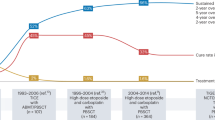Abstract
With the use of cisplatin-based combination chemotherapy, metastatic testicular germ cell tumors can be cured in 70–80% of patients. Patients refractory to cisplatin-based chemotherapy have a very poor prognosis. Several mechanisms have been discussed for the development of platinum resistance such as a decreased intracellular concentration of the drug, increased repair of the drug induced damage, or an altered apoptotic response to this damage. Various chemotherapeutic agents have been evaluated in intensively pretreated or cisplatin-refractory patients. Neither the antracyclines nor vinorelbine, bendamustine, topotecan, nor biological agents such as suramin and retinoic acid have demonstrated clinical activity. Paclitaxel has been evaluated at different doses and schedules and yielded a response rate of 21% (range 11–30%) with individual patients achieving complete remissions. This has led to the inclusion of paclitaxel in salvage regimens in combination with cisplatin and/or ifosfamide. Two recent studies have evaluated gemcitabine in refractory germ cell tumors, demonstrating a response rate of 17% (95% CI: 7–28%) in 52 intensively pretreated patients, two-thirds of whom had relapsed after previous high-dose chemotherapy plus autologous stem cell transplantation. The nonhematologic toxicity of weekly gemcitabine at doses of 1000–1250 mg/m2 was tolerable and hematologic side effects included thrombocytopenia in approximately 20% of patients. Ongoing studies in refractory germ cell tumors performed by the German Testicular Cancer Study Group (GTCSG) are evaluating oxaliplatin, a platinum derivative with incomplete cross-resistance to cisplatin. Future trials combining new active agents may make it possible to test the use of alternating treatment strategies in patients with “poor prognostic” disease or as salvage treatment. It is hoped that the increase in knowledge of the molecular mechanism of testicular cancer may lead to the development of new therapeutic options.
Similar content being viewed by others
Author information
Authors and Affiliations
Rights and permissions
About this article
Cite this article
Kollmannsberger, C., Mayer, F., Kuczyk, M. et al. Treatment of patients with metastatic germ cell tumors relapsing after high-dose chemotherapy. World J Urol 19, 120–125 (2001). https://doi.org/10.1007/s003450000192
Issue Date:
DOI: https://doi.org/10.1007/s003450000192




